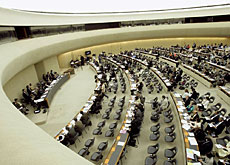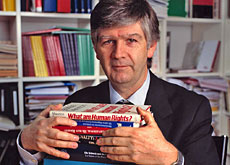UN rights watchdog agrees Darfur mission

The United Nations Human Rights Council is to send a high-level mission to Sudan's Darfur region to probe claims of worsening abuses against civilians.
On Wednesday the 47-strong body approved a compromise proposal – supported by Switzerland – after a two-day emergency session.
The resolution expressed concern at the “seriousness of the human rights and humanitarian situation in Darfur” but stopped short of condemning the Sudanese government for widely documented atrocities.
The UN estimates that at least 200,000 people have been killed in the region since 2003 and more than two million others displaced.
Members did decide, however, to send a team of “highly qualified persons” appointed by the council president, along with the special rapporteur for human rights in Sudan. The mission is expected to hand over its report in March.
European countries had been holding out for a group of independent experts, whereas African countries just wanted to send diplomats to the region.
Speaking after the meeting, Switzerland’s ambassador to the UN in Geneva, Blaise Godet, said he was satisfied with the outcome. He added that the decision proved the council was capable of speaking with one voice.
“I am relieved, because if the council had not been able to send this message regarding one of the worst humanitarian crises, it would have diminished its reputation,” he said.
The dispatch of five people representing the five regional groups was a “good compromise”, he added.
Calling the decision a “timid response,” human rights group Amnesty International nevertheless welcomed the fact that the Council had “finally shown signs of parting company with the shameless lies and half-truths of the Sudanese government.”
“Nightmare”
Speaking at the opening of the special session on Tuesday, UN Secretary-General Kofi Annan called for an immediate end to the “nightmare” in Darfur.
“The people in Darfur cannot afford to wait another day. The violence must stop. The killings and other gross violations of human rights must end,” he said.
Godet, who also addressed the meeting, described the situation in Darfur as “alarming and intolerable”.
The Swiss ambassador, who is vice-president of the council, said the Sudanese government had a duty to protect the population and to bring those responsible for crimes to justice.
It was the first time that the six-month-old council, which stems from a Swiss initiative, had devoted a special session to the humanitarian crisis in Darfur.
Members finally voted to do so last month following heavy criticism from Annan, who accused the council of simply focusing on the Arab-Israeli conflict.
Skilful manoeuvring by Arab and Muslim countries ensured that all three previous special sessions were on the Middle East. The Darfur debate was seen as important test for the credibility of the council.
swissinfo with agencies
The Geneva-based council, which replaced the widely discredited Human Rights Commission, has so far focused most of its attention on the Arab-Israeli conflict.
The Darfur session is its fourth emergency session, following two special meetings on the Palestinian territories and one on Lebanon.
The UN Human Rights Council meets at least three times a year for a minimum of ten weeks and can call emergency sessions to respond to crises.
It is the most senior UN body based in Geneva.
Switzerland was elected to the council with a three-year mandate on May 9.
A country needs the support of at least 16 members to call a special session.

In compliance with the JTI standards
More: SWI swissinfo.ch certified by the Journalism Trust Initiative










You can find an overview of ongoing debates with our journalists here . Please join us!
If you want to start a conversation about a topic raised in this article or want to report factual errors, email us at english@swissinfo.ch.